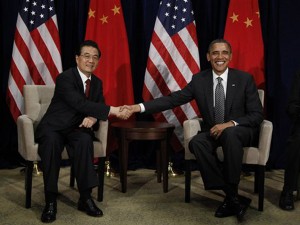HONOLULU – US President Barack Obama warned Saturday that China must “play by the rules” of global trade as he limbered up for his first summit in 10 months with Chinese President Hu Jintao.

President Barack Obama meets with Chinese President Hu Jintao at the APEC Summit in Honolulu, Saturday, November 12, 2011. CHARLES DHARAPAK /AP PHOTO
Hu and Obama were due to meet on the eve of a wider Asia-Pacific summit, which comes as signs proliferate of increasing security and economic competition between the United States and the rising Asian giant.
The two leaders were expected to talk through a slate of security and economic issues, including US calls for China to permit its yuan currency to rise and US concerns over latest assessments of Iran’s nuclear program.
The meeting will take place amid rising domestic political pressure on Obama over China’s trade record from the Republican presidential field and in Congress, as the president gears up for a tough reelection fight next year.
At a meeting with CEO’s, Obama singled out China’s record on intellectual property protection amid complaints from US corporations that their innovation and products are being unfairly compromised and copied.
“For us not to get that competitive advantage that we need in a large marketplace like China is not acceptable,” Obama said.
“The bottom line is that the United States can’t be expected to stand by if there is not the kind of reciprocity in our trade relations and our economic relationship that we need.”
The president also noted the long-running dispute between the United States and China over currency and said most experts believed that the yuan was unfairly undervalued despite some appreciation this year.
“We want you to play by the rules, and currency is probably a good example,” Obama said, paraphrasing his message to Chinese leaders, ahead of his first meeting with Hu since he welcomed him on a state visit in January.
Washington believes that Beijing keeps the yuan artificially low to boost its exports in a way which compromises the competitiveness of its own firms in the global marketplace.
But despite his clear message to China, Obama said he believed there could be “friendly and constructive” competition between the two Pacific rivals and that it was not inevitable that disputes should lead to “sharp conflict.”
Obama, who is hosting the Asia-Pacific Economic Cooperation (APEC) summit here, will move on later in the week to Australia and an East Asia summit in Bali, as part of America’s effort to cement its role as a major Pacific power.
In Australia, he is expected to announce a detachment of US marines will be based in the northern city of Darwin in a development seen as a sign to China that Washington will defend its interests and its allies in the region.
Many observers perceive rising competition between the two countries – and see the Trans-Pacific Partnership (TPP), a new trade grouping which could encompass 10 nations, but not China, as one source of future discord.
Obama said at the CEO summit that broad agreement had been reached on the principles of the deal in Hawaii, and he hoped for concrete progress next year on a pact liberalizing trade, and lowering barriers in agricultural, service and other sectors.
The president’s deputy national security advisor for international economics, Michael Froman, was asked by reporters Saturday about China’s complaints about not being invited into the TPP.
“TPP is not something that one gets invited to. It’s something that one aspires to,” he said, noting basic standards required of members, which include strong intellectual property enforcement.
For his part, Hu also laid out China’s negotiating position before his talks with Obama.
He said in a speech that Beijing backed the idea of an Asia-Pacific free trade area and regional economic integration based on various proposals including the TPP.
But he made no mention of any Chinese attempt to get involved in the evolving pact.
In the run-up to the APEC summit, China complained Washington was setting its goals too high on trade liberalization and lowering tariffs on green industries.
It also suggested TPP entry requirements may prove too onerous for some Asian nations.
Hu and Obama are also expected to discuss last week’s report by the International Atomic Energy Agency (IAEA) that it had “credible” evidence that Iran had worked towards nuclear weapons.
China, along with Russia, has expressed opposition to the idea of more international sanctions on Iran, despite Washington’s calls for more action to isolate the Islamic Republic over its nuclear program.